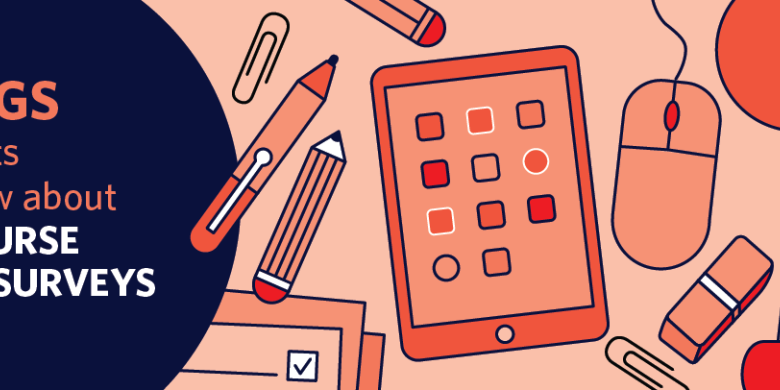
Download the 10 things... as PDF
The 'Why'?
1. Your feedback leads to meaningful changes and helps improve courses for future students
Comments from students are used to revise course materials, restructure assessments, and even rethink how whole courses are built and taught. Your comments regarding course material such as what worked well and suggestions for change can make a real difference for the next group of learners. You might not see the changes—but they do happen.
2. This is one of the few ‘official’ ways to share your perspective with comments formally reviewed by instructors, departments and program leaders
All courses ask the same core group of questions each time they run, making this a really comprehensive source of student perceptions and feedback. There may be other opportunities you have to provide your feedback as well, but here, your responses are recorded and used to inform future decisions on course delivery.
3. Student feedback matters! It feeds into career decisions for faculty
Students are uniquely positioned to be able to provide feedback on the instruction they have experienced: this feedback is one of the types of data that is used to evaluate the teaching performance of faculty over a period of time. Evaluation of a faculty member’s teaching is a key component in career advancement decisions around promotion, gaining tenure and merit increases. Your feedback plays a role in a structured process by which a faculty member’s teaching is assessed, so your responses have professional consequences.
4. The more students respond, the stronger the message, and institutional confidence in the value of the feedback
Individual students’ feedback on a course is important, but equally helpful is the aggregate view across the cohort. When more people complete the questionnaire, your collective voice becomes clearer and more representative and creates a more compelling message.
The 'How'?
5. Feedback isn’t just for fixing problems—it’s also for recognising what worked well
The purpose of end of course surveys is not just a space to critique the experience. If something – or someone – really helped you succeed in the course —like great resources, supportive course atmosphere, or an inspiring instructor or TA —say so! Your instructors read these comments and positive feedback motivates instructors and helps them keep doing what’s working. It also lets other readers in departments know what students value most.
6. Be specific—both when praising and critiquing—helping to know what to improve or preserve
Saying “I liked the course” or “this class was boring” doesn’t give anyone much to work with. Try to explain what was effective or less so. Just as feedback to support your learning in your courses needs to be clear, specific and actionable, the same is true for feedback on your courses.
7. Feedback is anonymous—but still worth doing well
Your name isn’t attached to your responses when they are provided to instructors or departments, and instructors don’t see course feedback survey reports until well after grades are submitted for a particular course. But even though your comments are not attributed to you in person, they can still have a lasting impact—so make them thoughtful and useful.
8. You can be honest and respectful at the same time
A core value of the institution is that of respect for others, as articulated through the Respectful Environment Statement. All UBC community members, including students, are expected to uphold and enact these principles. When offering constructive criticism, you must do so within the bounds of maintaining a respectful environment. This means that insults, discriminatory comments and personal remarks against instructors will not be tolerated, and notwithstanding anonymity to instructors of your responses (described above), action can be taken. Instructors want to know honestly how the course landed for you—but comments that cross the line of a respectful environment are unacceptable.
9. Watch out for human bias—it can distort your feedback, so focus your comments on the course
Humans are imperfect, and harbor biases: mental shortcuts (or stereotypes) that our brain uses automatically, often without us even noticing, to make sense of people, situations, or information. All surveys, evaluation and selection processes involving human judgement contend with biases; they cannot be eliminated. For example, some academic research shows that women and racialized instructors often get lower ratings in student course surveys, even when their teaching quality is strong. UBC monitors aggregated data from student feedback questionnaires to help understand this, to interpret results and to check for evidence of systemic patterns. The advice for you as an individual is to keep your comments focused on your learning experience in the course, not aspects of the instructor’s identity, background, personality or mannerisms.
The 'Bottom Line'
10. It only takes a few minutes—make them count
We know students have many demands on your time, and you get many requests for surveys or to contribute your opinion, but this is worth your time. Whether it’s celebrating what or who helped you learn, offering ideas for improvement, or pointing out what didn’t work for you —this is your chance to have a voice in the processes that shape teaching and learning at your university.